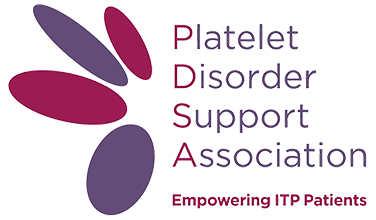
IVIG is a solution of IgG (immunoglobulin G) antibodies normally present in adult human blood.1 IgG antibodies are extracted from the combined plasma of more than 1,000 screened donors and treated to eliminate bacterial and viral contaminants. It is used to treat immune deficiency and many other conditions on-label and off-label.1
Different companies manufacture IVIG and each brand has slightly different features and side effect profiles. The Immune Deficiency Foundation Chart provides more information.
Articles:
- What Patients Need to Know About Plasma
- Alternative Treatments to IVIG in ITP Patients
Dosage
IVIG is given intravenously for a period of several hours. There are two different dosage options: .4 grams (g) / kilograms (kg) per day for five days, or infusions of 1 g/kg per day for one to two days. The higher-dose, shorter-term administration leads to a more rapid rise in platelet count, but higher toxicities.3
Side Effects
The most common side effects of IVIG include: headache, fever, chills, nausea or vomiting, muscle pain or chest pain. Fortunately, slowing down the rate of infusion can help eliminate these problems or decrease their severity. Premedication with acetaminophen, antihistamines or occasionally steroids can also help decrease side effects.4
Rare and more serious side effects include: blood clots8, hemolytic anemia, pulmonary edema and aseptic meningitis syndrome.5
Patients who are IgA (immunoglobulin A) deficient have a greater chance of developing anaphylactic shock.1 IVIG can cause renal dysfunction and renal failure, especially with preparations that are very concentrated or have a high sugar content.9
Managing Side Effects
As with any treatment, IVIG infusion has side effects. The key to getting the best results while minimizing adverse effects is working closely with your healthcare team. Here you will find a downloadable, printable document of helpful tips in decreasing the serious side effects of IVIG infusion. Discuss this information with your healthcare team prior to treatment.
Predicting Success
IVIG temporarily increases the platelet count in about 80 percent of ITP patients.2 The duration of the response varies and the treatment can be repeated when the platelet count drops.
IVIg does not work very well for those ITP patients who have anti-GPIbalpha antibodies on their platelets.6,7
Select a treatment table to view or download below.
IVIG Treatment Tables
References
- Wikipedia: intravenous immunoglobulin http://en.wikipedia.org/wiki/Intravenous_immunoglobulin
- Godeau B et al. “Intravenous immunoglobulin or high-dose methylprednisolone, with or without oral prednisone, for adults with untreated severe autoimmune thrombocytopenic purpura: a randomised, multicentre trial.” Lancet. 2002 Jan 5;359(9300):23-9. http://www.ncbi.nlm.nih.gov/pubmed/11809183
- Benesch M et al. “Low-dose versus high-dose immunoglobulin for primary treatment of acute immune thrombocytopenic purpura in children: results of a prospective, randomized single-center trial.” J Pediatr Hematol Oncol. 2003 Oct;25(10):797-800. http://www.ncbi.nlm.nih.gov/pubmed/14528103
- Kareva L, Mironska K, Stavric K, Hasani A. Adverse Reactions to Intravenous Immunoglobulins - Our Experience. Open Access Maced J Med Sci. 2018;6(12):2359-2362.
- Guo et al. Adverse Effects of Immunoglobulin Therapy. Frontiers in Immunology. 2018. doi: https://doi.org/10.3389/fimmu.2018.01299
- Webster ML et al. “Relative efficacy of intravenous immunoglobulin G in ameliorating thrombocytopenia induced by antiplatelet GPIIbIIIa versus GPIbalpha antibodies.” Blood. 2006 Aug 1;108(3):943-6. http://www.ncbi.nlm.nih.gov/pubmed/16861348
- Go RS et al. “The association between platelet autoantibody specificity and response to intravenous immunoglobulin G in the treatment of patients with immune thrombocytopenia.” Haematologica. 2007 Feb;92(2):283-4. http://www.ncbi.nlm.nih.gov/pubmed/17296593
- “FDA Safety Communication: New boxed warning for thrombosis related to human immune globulin products.” June 10, 2013
- "Dear Doctor Letter - Important Drug Warning: Immune Globulin Intravenous (Human)" https://www.fda.gov/BiologicsBloodVaccines/SafetyAvailability/ucm105914.htm





